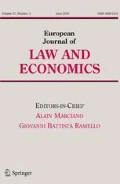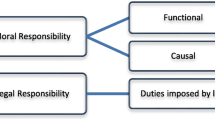Abstract
This study investigates the implications of integrity—interpreted as the alignment of one’s words and deeds—within the agency paradigm by explicitly allowing for unprincipled behavior (agent misconduct) in addition to conflicts of interest resulting from the separation of ownership and control. Under adverse selection, contracts that screen for agents who exhibit integrity characterize a previously unidentified symbiosis between the penalty for unprincipled behavior and high-powered incentive pay. The resulting contracts and penalties are interpreted in light of the Sarbanes–Oxley and Dodd–Frank Acts.
Similar content being viewed by others
Notes
This is because an agent’s preferences over a given bonus, B j , or action, a j , are the same regardless of whether the agent is an N-type or a U-type. By contrast, when an agent exhibits social preference over B j and/or a j it is possible that the agent with social preferences receives a lower B j for a higher a j . Such a possibility exists in Rabin (1993), Vanberg (2008), Eillingsen and Johannesson (2004), Sacconi and Fallo (2010) and Arce (2013).
References
Akerlof, G. A., & Romer, P. M. (1993). Looting: The economics of the underworld of bankruptcy for profit. Brookings Papers on Economic Activity, 2, 1–73.
Aragon, G. A. (2011). Financial ethics. A positivist analysis. Oxford: Oxford University Press.
Arce, D. G. (2010). Corporate virtue: Treatment of whistle blowers and the punishment of violators. European Journal of Political Economy, 26, 363–371.
Arce, D. G. (2013). Principals’ preferences for agents with social preferences. Journal of Economic Behavior and Organization, 90, 154–163.
Audi, R., & Murphy, P. E. (2006). The many faces of integrity. Business Ethics Quarterly, 16, 3–21.
Becker, G. S. (1968). Crime and punishment: An economic approach. Journal of Political Economy, 76(2), 169–217.
Berle, A. A., & Means, G. C. (1932). The modern corporation and private property. NY: Harcourt, Brace & World.
Cooper, R. (1984). On allocative distortions in problems of self-selection. Rand Journal of Economics, 15, 568–576.
Cressy, R., Cumming, D., & Mallin, C. (2012). Law, ethics and finance: Implications for international investment and portfolio management. European Journal of Finance, 18(3–4), 185–189.
Economist. (2003). Where’s the stick? The Economist, 369(8345), 13.
Ellingsen, T., & Johannesson, M. (2004). Promises, threats and fairness. Economic Journal, 114(495), 397–420.
Engelen, P.-J. (2004). Criminal behavior: A real option approach with an application to restricting illegal insider trading. European Journal of Law and Economics, 17(3), 329–352.
Fuller, J., & Jensen, M. C. (2010). Just say no to Wall Street: Putting a stop to the earnings game. Journal of Applied Corporate Finance, 22(1), 59–63.
Goldman, E., & Slezak, S. L. (2006). An equilibrium model of incentive contracts in the presence of information manipulation. Journal of Financial Economics, 80, 603–626.
Hare, R. M. (1981). Moral thinking. Oxford: Oxford University Press.
He, L., & Ho, S.-J. K. (2011). Monitoring costs, managerial ethics and corporate governance. Journal of Business Ethics, 99(4), 623–635.
Jensen, M. C. (2006). Putting integrity into finance theory and practice: A positive approach (PDF of keynote slides), revised version. Harvard NOM Working Paper No. 06-06.
Jensen, M. C. (2010). Business school’s failure to instill ethical and moral values in our students: A suggested approach. Fordham University, Deming Memorial Lecture, 11 May. http://digital.library.fordham.edu/cdm4/item_viewer.php?CISOROOT=/VIDEO&CISOPTR=95&CISOBOX=1&REC=15.
Kolb, R. W. (2012). Too much is not enough. Incentives in executive compensation. Oxford: Oxford University Press.
Mishel, L. & Sabadish, N. (2012). CEO pay and the top 1%. Issue Brief, Economics Policy Institute, 2 May, 331: 1–7.
O’Connor, J. P., Jr, Priem, R. L., Coombs, J. E., & Gilley, K. M. (2006). Do stock options prevent or promote fraudulent financial reporting? Academy of Management Journal, 49(3), 483–500.
Rabin, M. (1993). Incorporating fairness into game theory and economics. American Economic Review, 83(5), 1281–1302.
Sacconi, L., & Faillo, M. (2010). Conformity, reciprocity and the sense of justice. How social contract-based preferences and beliefs explain the norm compliance: Experimental evidence. Constitutional Political Economy, 21(2), 171–202.
Simons, T. (2002). Behavioral integrity: The perceived alignment between managers’ words and deeds as a research focus. Organization Science, 13(1), 18–35.
Thurm, S. (2013). ‘Pay for performance’ no longer a punchline. Wall Street Journal, 31 March, B1.
Vanberg, C. (2008). Why do people keep their promises? An experimental test of two explanations. Econometrica, 76(6), 1467–1480.
Acknowledgments
This paper has benefitted greatly from the suggestions of two anonymous referees.
Author information
Authors and Affiliations
Corresponding author
Rights and permissions
About this article
Cite this article
Arce, D.G. Integrity, unprincipled agents and corporate governance reform. Eur J Law Econ 39, 539–551 (2015). https://doi.org/10.1007/s10657-014-9478-4
Published:
Issue Date:
DOI: https://doi.org/10.1007/s10657-014-9478-4



